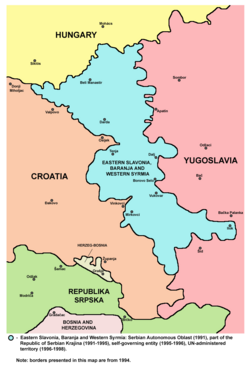United Nations Transitional Administration for Eastern Slavonia, Baranja and Western Sirmium
| UNTAES | |
|---|---|
| operation area | East Slavonia , Baranja , West Syrmia |
| German name | United Nations interim administration for East Slavonia, Baranja and West Syrmia |
| English name |
United Nations Transitional Administration for Eastern Slavonia, Baranja and Western Sirmium |
| Based on UN resolution | 1037 (January 15 1996) |
| Other UN resolutions | 1079 (November 15, 1996) 1120 July 14, 1997 |
| Beginning | January 1996 |
| The End | January 15, 1998 |
| management |
Jacques P. Klein ( USA ) February 1996 - August 1997 William G. Walker (USA) August 1997 - February 1998 |
| Operating strength (max.) | ~ 5,000 military personnel ~ 460 civilian police officers 95 military observers + civilian staff |
| Deaths | 11 |
The United Nations Transitional Administration in Eastern Slavonia, Baranja and Western Sirmium (abbreviation UNTAES , German interim administration of the United Nations for East Slavonia, Baranja and West Syrmia ) was a transitional administration established by the United Nations after the Croatian War , whose task is the peaceful reintegration of the Territory in Croatia, monitoring demilitarization and the return of refugees and holding elections in Croatian regions.
Basics
At the end of 1995, negotiations on the future of Eastern Slavonia , Baranja and Western Syrmia were being held in parallel to the Dayton Agreement . The area has been under Serbian control since the fall of the city of Vukovar , the central town .
The agreement between Serbia and Croatia was signed on November 12, 1995 in Erdut . It stipulated that the UN Security Council set up an interim administration for a certain period of time. An international armed force has been authorized to ensure peace and general security.
On January 15, 1996, the UN Security Council approved a UN peacekeeping mission in this area, the mandate of which was extended to a total of two years by subsequent resolutions. UNTAES and the Peace Implementation Forces (IFOR) are invited to work together.
On the basis of UN Resolution 1037, the NATO Council decided on January 26, 1996 that IFOR should provide close air support to UNTAES on request and evacuate personnel in an emergency.
UN Resolutions No. 1037, No. 1079 and No. 1120 formed the basis of the mission .
Attendees
Egypt, Argentina, Bangladesh, Belgium, Brazil, Denmark, Fiji, Finland, Ghana, Great Britain, Indonesia, Ireland, Jordan, Kenya, Lithuania, Nepal, Netherlands, Nigeria, Norway, Austria, Pakistan, Poland, Russia, Sweden, Switzerland , Senegal, Slovakia, Czech Republic, Tunisia, Turkey, Ukraine, USA.
UN representative on site: Jacques P. Klein later for the last 4 months William G. Walker (USA)
Troop Commander : Major General William Hanset (Belgium)
Police Commander: Brigadier General Walter Fallmann (Austria).
Web links
- For more information (english)
- Text of the Erdut Agreement (English)

